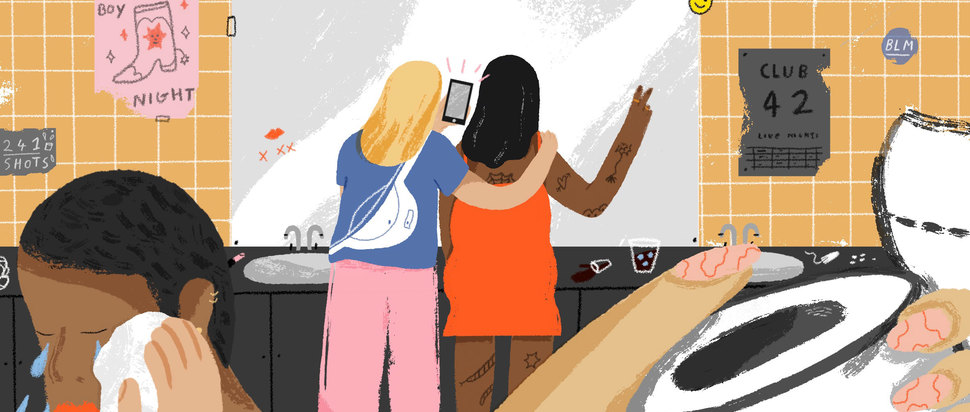To All the Clubs I've Loved Before
Nearly a year since they shut, our Clubs editor reflects on the wonders of the club toilet and why clubs are so important
There’s a section in writer and performance artist Travis Alabanza’s latest theatre production, Overflow, dedicated to the wonders of the club toilet. “Club toilets have taught me more about sisterhood than any book,” says the protagonist, Rosie, when detailing a memory of unity between a group of new friends. That statement will ring so true to anyone who has ever shared one of those fleeting, yet incredibly intimate moments.
Entering the club toilets can be like entering Narnia; you don’t know what’s going to happen or how long you might be in there. More often than not you’ll leave with a new perspective on life and at least one new date in your phone calendar for a cheese and wine night. In years to come, you’ll find yourself scrolling through social media when one of those fleeting friends pops up with the announcement of an engagement, or a new job, or that they’ve baked their first focaccia, and it will always remind you of the bathroom bond you once shared.
It’s approaching a full year now since clubs in the UK were forced to close, and since many of us have experienced one of those moments of intense, transient friendship in a club toilet. You’ll never feel more confident or ready to take on the world than after a lengthy pep talk with your new best pals in the loos, and you’ll walk back into the club feeling like Mis-Teeq in the Scandalous video. Sadly, these friendships might not always last but in those moments you feel like you’ve developed an unbreakable, lifelong bond.
There’s something about club toilets that make you feel safe. No toilet roll in your cubicle? Someone will pass you some. Throwing up? Someone will knock on your door to check you’re OK. Crying in the corner? Someone will be there to wipe away the tears and help you fix your make-up. There are few other places where people come together quite like they do in club toilets. They are a place where age, gender and sexuality don’t matter, and where anyone who tries to make them matter will quickly be put in their place.
I miss the club toilets almost as much as I miss clubs themselves. I miss the feeling of the bass from the speakers pulsing through your body so much that you feel a bit sick. I miss that knowing look you throw to your friends when your favourite tune comes on. I miss discovering a new favourite tune that you will go on to play at least 50 more times that night, and on nights to come. I even miss the annoying people in clubs, who you spend the whole night trying to avoid and eventually end up screaming at in the smoking area. I miss the joy, the euphoria, and the escape from reality that is so singular to the club experience.
Nightclubs have been hit incredibly hard by the ongoing COVID pandemic, with a recent survey by the Night Time Industries Association suggesting that over 80% of nightclubs within the UK would not survive past February. Many businesses in the sector have been forced to turn to crowdfunding over the course of the last year due to insufficient financial support from the government to assist with their survival.
Losing nightclubs would mean losing a crucial part of UK culture, and the impact of their loss on the creative community would be catastrophic. While some have been able to adapt their venues to become COVID-secure and allow for social distancing, many have sadly lain empty for the last 12 months. But new trials incorporating health passports using the YouCheck app and a new ventilation system called the Pathogen Reduction System could see the live music and nightlife sectors slowly return, with trials due to begin at London’s 100 Club and Bristol’s Exchange this month.
For what feels like the first time in the last year, the return of nightclubs was finally addressed in one of the government’s Coronavirus updates last month by the Prime Minister, who suggested that rapid lateral flow tests – which can provide test results within 30 minutes – could be used to allow for the safe reopening of the sector. However, when, or even if, these will be introduced and exactly how they will operate was not clarified.
Clubs are an essential and joyous part of life. They are a place to feel free: free of judgment, free of labels, and free of inhibitions. They have been there through my highest and lowest of times and I, like many, cannot bear the thought of them never coming back. To all the clubs I’ve loved before, you are my sanctuary and I hope we will be back together soon.
